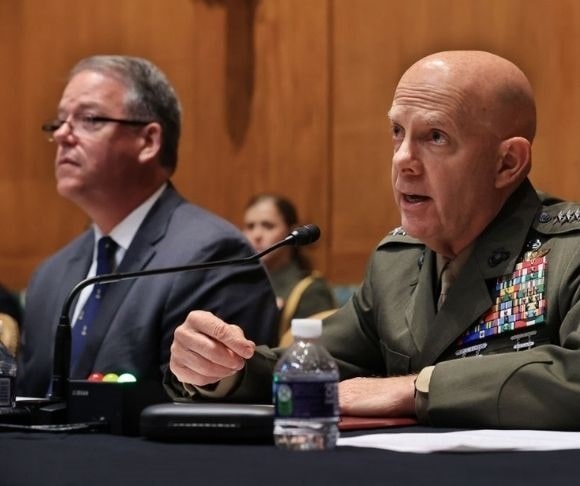A September 2021 Government Accountability Office (GAO) report titled “DOD Has Adopted Practices to Manage within the Constraints of Continuing Resolutions [CR]” reveals that the waste and disruption to defense programs that attend CRs are now regular order. The language of the U.S. Constitution is clear as can be. Congress’s responsibility is to pass an annual appropriations bill to fund all the executive branch cabinet agencies, offices, and programs. Put simply, Congress pays for the entire federal government’s annual bills. One could argue that the Defense Department’s myriad accounts payable are the most critical.
The congressional budget process is byzantine at best and incomprehensible at worst, but each year there is an expectation, as slender a reed as that is, that Congress would do its funding job. Unfortunately, year after year, that expectation is dashed. Writing for Defense News, Joe Gould provided a good explanation of what a CR is. He explains:
“A continuing resolution, or CR, is a temporary measure Congress can use to fund the government for a limited time. CRs are typically used to buy time for lawmakers to enact longer-term spending measures. Passage of a CR usually means the normal process of passing the 12 appropriations bills by the start of the fiscal year has failed because of a standoff between political parties, or between Congress and the president.”

House Speaker Nancy Pelosi
(Photo by Drew Angerer/Getty Images)
The immediate impact is that spending for that CR fiscal year is limited to the spending rate of the previous year. Consequently, there can be no new program starts during a CR because there was no funding associated with those programs during the previous year. So, for example, if a defense acquisition program was supposed to start in October of FY 2022, but there is only a CR in place, that program cannot start. Gould explained, “Before the start of fiscal 2018, for example, the Pentagon identified 75 weapons programs that would experience delays because of the CR’s prohibition on starting new programs and because quantities would be restricted on 40 programs.”
The CR is an emergency appropriation and was originally intended to cover government funding only in unusual circumstances. But the “unusual” has become usual. From 2002 through 2019, the Defense Department started “the fiscal year under a CR for 13 of the 18 years and every year since FY2010 excluding FY2019.” That means Congress has done its job only 30% of the time – not the work ethic one seeks in employees. DOD has operated under a CR for an average of 119 days per year during the period FY2010-FY2019, according to an August 15, 2019, Congressional Research Service (CRS) analysis. Additionally, the CRS report described the negative impacts of a CR:
“By its very nature, an interim CR limits an agency’s ability to take advantage of efficiencies through bulk buys and multi-year contracts. It can foster inefficiencies by requiring short-term contracts that must be reissued once additional funding is provided, requiring additional or repetitive contracting actions.”
It is not surprising and should be expected that the Defense Department has adopted “workarounds” to accommodate the impact of a CR. In another GAO report released in February 2018, the investigation identified the challenges for government agencies generally under a CR. The impacts were identified as inefficiencies that stem from the uncertainty of complete government shutdown and “delays and rework in contracts, grants, and hiring.” The most recent GAO report, by contrast, explained that:
“Although DOD officials reported acquisitions were constrained by CR provisions that restrict starting new programs and production rate increases, the programs GAO reviewed were able to avoid delays or cost increases during the fiscal years with CRs. The military services have instituted some practices to minimize the effects of CRs, including initiating service contract start dates after the first quarter of the fiscal year and postponing nonessential purchases and training to later in the fiscal year.”
Some in Congress see the problem and are not happy. Representative Rob Wittman (R-VA) has been a consistent champion of forcing legislators to do their jobs. In a press release, Wittman chided his colleagues:
“If Members of Congress cannot get their most basic responsibility of funding our government done, we must be held accountable. There are serious consequences to this crisis budgeting. Even when Congress manages to avoid a shutdown and pass stop-gap continuing resolutions (CRs), the American people suffer. Under a CR, all spending remains the same; our military and federal agencies can’t fund new programs, cut outdated ones, or plan for the future.”
 Wittman introduced legislation in 2019 he called, “Inaction has Consequences Act.” The bill said that if Members of Congress don’t do their jobs and pass appropriations bills on time, they don’t get paid. That’s a concept that every working man and woman in America can understand. Wittman’s piece of legislation did not pass.
Wittman introduced legislation in 2019 he called, “Inaction has Consequences Act.” The bill said that if Members of Congress don’t do their jobs and pass appropriations bills on time, they don’t get paid. That’s a concept that every working man and woman in America can understand. Wittman’s piece of legislation did not pass.
The most recent GAO report touting the Defense Department’s ability to adjust to the inefficiencies and program disruptions may be comforting for Congress not passing appropriations on time. But adjusting to inefficiencies and disruptions does not mean they don’t exist. The Military Department’s comments on the 2021 GAO report indicated that perpetual CRs are limiting and challenging to good program management. More to the point, the report is an indictment of Congress for abysmal job performance in passing appropriations bills. Unfortunately, Congress’s failure to do its job on time guarantees the waste for which legislators love to criticize the executive branch will continue.
The views expressed are those of the author and not of any other affiliation.
~
Read more from Dave Patterson.




